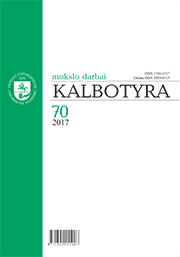Adverbs as evidentials: an English-Spanish contrastive analysis of twelve adverbs in spoken and newspaper discourse
Adverbs as evidentials: an English-Spanish contrastive analysis of twelve adverbs in spoken and newspaper discourse
Author(s): Marta Carretero, Juana I. Marín-Arrese, Julia Lavid-LópezSubject(s): Lexis, Semantics, Pragmatics, Comparative Linguistics
Published by: Vilniaus Universiteto Leidykla
Keywords: evidential adverbs; indirect-inferential evidentiality; indirect-reportative evidentiality; pragmaticalization; clausal position;
Summary/Abstract: This paper presents a contrastive analysis of six English evidential adverbs ending in -ly with their Spanish nearest translation equivalents, in spoken and newspaper discourse. The adverbs may be associated with varying degrees of reliability: high (clearly/claramente, evidently/evidentemente, obviously/obviamente), medium (apparently/al parecer) and low (seemingly/aparentemente, supposedly/supuestamente). The analysis is based on tokens of authentic language extracted from two contemporary corpora, the Corpus of Contemporary American English (COCA) and the Corpus de Referencia del Español Actual (CREA). The qualitative analysis focuses on the evidential functions of the adverbs and on their pragmatic interactional uses; the quantitative analysis centres on the relative frequency of type of evidential functions and the clausal position of the adverbs. The results uncover a number of differences between the English adverbs and their Spanish correlates and also between the two discourse types. Practically all the adverbs are strongly specialized in expressing either indirect-inferential or indirect-reportative evidentiality. English obviously and Spanish evidentemente show a high frequency of cases of loss of evidential meaning due to pragmaticalization, specifically in spoken discourse. Regarding position, the English adverbs are more frequent in medial clausal position, while some Spanish adverbs are often found in the more prominent parenthetical position.
Journal: Kalbotyra
- Issue Year: 2017
- Issue No: 70
- Page Range: 32-59
- Page Count: 28
- Language: English

